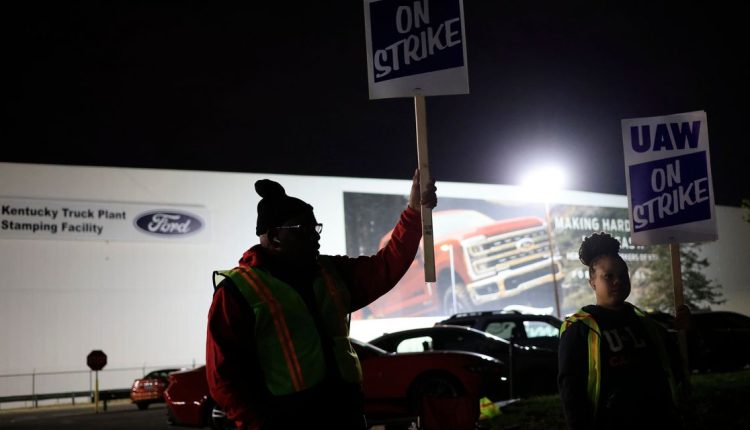United Auto Workers President Shawn Fain said Friday that the union may call on more workers at Big Three facilities to strike “at any time,” shifting the labor movement’s strategy a month in.
“With the threat of a strike, we can get them moving,” Fain said at a scheduled address to the membership, during which he did not call for more walkouts. “We changed the rules, and now there’s only one rule: Pony up.”
The UAW on Wednesday surprised markets by calling for a strike expansion at Ford Motor Co.’s
F,
pickup-truck plant in Louisville, Ky., striking at the heart of the automaker’s profits and a “major piece” of its production footprint.
The strike started on Sept. 14, with workers walking out at one plant each of Ford, General Motors Co.
GM,
and Stellantis NV
STLA,
Strikes at additional plants and facilities of all three carmakers had been announced on subsequent Fridays.
The UAW strategy changed because Ford, GM and Stellantis seemed to be waiting for Fridays to make progress in the negotiations, Fain said.
“We are entering a new phase of this fight, and it demands a new approach,” he said.
Ford’s Louisville plant produces F-Series Super Duty vehicles as well as the Ford Expedition and the Lincoln Navigator, and it generates $25 billion a year in revenue. In May, Ford Chief Executive Jim Farley called it Ford’s most profitable plant in the world.
Ford said it has reached its limit on a contract offer and has warned of more furloughs as a cascading effect from the strike.
Several Wall Street analysts have said that the “maximum pain” for the carmakers would be strikes at plants making the high-margin, highly sought-after pickup trucks.
Besides the Ford plant in Kentucky, those key plants include GM’s Arlington, Texas, assembly line making Chevy Suburbans, GMC Yukons and Cadillac Escalades, and a Stellantis complex in Detroit making Jeep Cherokees and Dodge Durangos.
Todd Dunn, president of the UAW chapter representing the 8,700 workers at Ford’s Kentucky truck plant, said that there was some nervousness and anxiety about going on strike, and he has heard concerns from single earners and others in tight financial situations.
According to Ford, its workers on strike go from earning $1,500 a week on average to $500 a week in strike pay.
Overall, however, the workers are “driven” and “fed up with the status quo at Ford Motor Company,” including the tiered wage system, in which it takes years for new hires to reach higher pay levels, as well as raises that haven’t kept up with the cost of living, Dunn said.
“It was a career job. It’s not like that anymore,” he said.
Striking at all three car companies was a break with tradition. The UAW has historically called for a strike at one car company at a time, in part to preserve picket-line firepower and its strike fund.
Read the full article here

